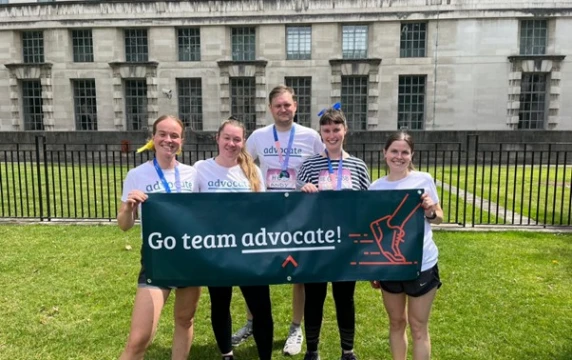"In all my pro bono cases, I felt that I was able to make a positive difference by ensuring equality of arms and advancing the best possible case for litigants in persons, who are often vulnerable."
Panel member Lucas Nacif of Farore Law reflects on his dedicated practice, encouraging other "baby" juniors to take the leap and volunteer. Since joining Advocate last year as a panel member, Lucas has worked over 100 hours pro bono and was shortlisted and commended for the John Collins Pro Bono Excellence Award in the 2024 Bar Pro Bono Awards. Lucas also provides us with insight of the advantages of the Employed Bar being involved with Advocate.
At what stage of your career did you take on your first pro bono case?
Once I started my second-six, I immediately joined Advocate as a panel member and have since been actively involved in advising and representing Claimants in the Employment Tribunals and the Employment Appeal Tribunal on a pro bono basis. Indeed, in 2023, I have worked over 100 hours pro bono (representing nearly 10% of my practice!).
Why did you decide to undertake pro bono work?
There are two reasons for undertaking pro bono work as a barrister:
a) Doing pro bono work allows pupil barristers and “baby” juniors to be on their feet more often and do types of cases that they would otherwise not be exposed to if their practice solely focussed on remunerated work.
Being an active panel member at Advocate has allowed me to do a wide range of interesting work – from representing a Claimant in an anonymity hearing in the Employment Tribunal to resisting a strike-out in an associative indirect discrimination claim in the Employment Tribunal (which involved issues of retained EU law). It goes without saying that incorporating pro bono work as part of my practice has improved my advocacy skills and made me a much better lawyer
b) It’s a great way of giving back.
The unfortunate reality is that litigants in the Employment Tribunals are often unrepresented and lack specialist legal advice, whereas employers have enough resources to instruct law firms and counsel. Furthermore, discrimination and whistleblowing law is very complex and many litigants in persons therefore struggle to properly articulate their claims (even where the case has good merits). In all my pro bono cases, I felt that I was able to make a positive difference by ensuring equality of arms and advancing the best possible case for litigants in persons, who are often also vulnerable.
What was the most memorable pro bono case you worked on, and what did you do?
Recently, I successfully represented the appellant in Haziz Rahim v The BigWord Overseas Interpreting Limited in the Employment Appeal Tribunal, where I persuaded the EAT that the Employment Tribunal had erred in law when it struck out the Claimant’s discrimination and whistleblowing claim for being out of time without ascertaining the Claimant’s pleaded case in sufficient detail. In essence, a Tribunal cannot strike-out a discrimination or whistleblowing claim on limitation grounds if the Tribunal is unsure of what the detriments or acts of less favourable treatment were.
I picked up this case in extremely short notice. I had returned from holidays on Monday, 10 December and decided to pick up this case in the afternoon only to then attend the EAT hearing the morning after!
What was unique about this case was that the Claimant (who was unrepresented in the Employment Tribunal) had submitted an ET1 in excess of 200 pages which, instead of containing a coherent set of pleadings, contained various extracts of documents and text messages relevant to his case. Whilst the Employment Tribunal could have rejected his claim on grounds that it was in a form which could not sensibly be responded, it chose not exercise such powers and instead listed a preliminary hearing to determine whether the Claimant’s claim was out of time.
The Rahim decision is in my view an important decision on access to justice, as it serves a cautionary tale for Employment Tribunals to proceed with caution when striking out a discrimination or whistleblowing claim in circumstances where the Claimant is unrepresented and the ET1 is poorly pleaded. Being able to achieve a massive victory for the appellant (in my first ever EAT appearance) and setting precedent which further advances access to justice for discrimination and whistleblowing claimants in the Employment Tribunals is without a doubt one of my proudest achievements to date.
How has your experience as an employed barrister affected your experience of doing pro bono work?
I work in a boutique employment litigation firm in London that widely encourages its fee earners to undertake pro bono work. Since day one of practice, my firm’s Managing Partner, Suzanne McKie KC, has actively encouraged me to pick up pro bono cases to ensure that I am on my feet often and to develop my skills in dealing with vulnerable clients.
The benefit of being an employed barrister within a law firm is the supportive work culture. My firm has a team of very experienced solicitors and barristers who have in the past provided me with very useful guidance when undertaking pro bono work.
Are you an Employed Barrister interested in pro bono work?
Check out our Guide to Pro Bono for the Employed Bar that we produced last year in partnership with the Bar Council, the Bar Association for Commercial, Finance & Industry, the Free Representation Unit, the In House Pro Bono Group and the Government Legal Department.
Find out more about volunteering with Advocate and the Pupil Pledge. Read more about how we can support you through Collaborate, our case-based mentoring scheme.







